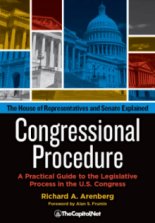Committee Veto / Congressional Veto (CongressionalGlossary.com)
From the Congressional Glossary – Including Legislative and Budget Terms Committee Veto / Congressional Veto A requirement added to report language directing that certain policy directives by an executive department or agency be reviewed by certain congressional committees before they are implemented. Under common practice, the government department or agency and the committee involved are … Read more


